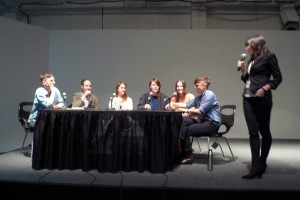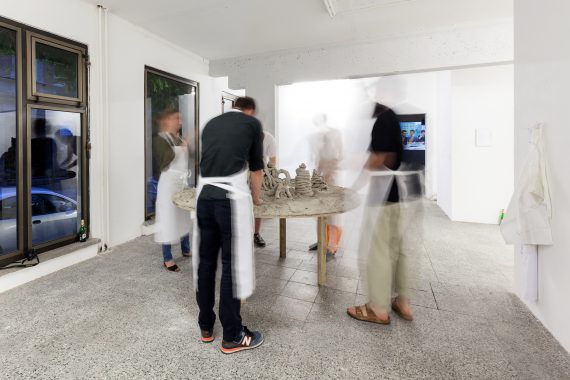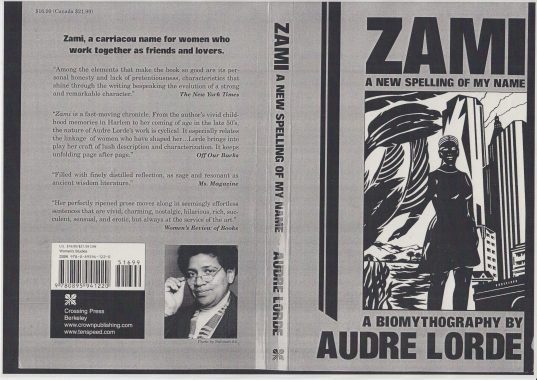During the Panel Discussion BREAKING WITH HOMOGENEITY at the OPEN FORUM – Curated by Amanda Parmer at THE ARMORY SHOW, NEW YORK CITY, YES! Association / Föreningen JA! made the following statement:
M: Thank you Amanda Parmer for inviting us to the Open Forum and this panel discussion together with our friends Hanna Wilde, A.K. Burns, Clark Solack, and Litia Perta. Without you nothing would be worth it.
M: Financial Statement, March 11, 2012
Å: Hello, my name is Lee H. Jones but you can call me Killjoy or YES! Association / Föreningen JA!. We want to talk about money. First of all I want to share some facts with you. For every dollar that male artists make on this art fair, female artists only make a quarter. I also want to share that we don’t get paid by the Armory Show to speak here in front of you today. I can be here only because the Swedish National Board for Youth Affairs section for State Grants to Womens Organisations support our activities. The aim of the grant is to support women’s societies and associations, to promote women’s participation in the democratic process and in the life of society, and to stimulate women’s opportunities to defend their rights and make their voices heard.
M: I think that I am invited here today by The Armory Show to make my voice heard and to add criticality, difference and diversity, so called cultural capital, and through that increase the amount of monetary capital circulating at this fair. For free.
Å: And here we are, a very white-ish, well-behaved middle class-ish group of queer, trans and straight art workers that were given the possibility to talk under the umbrella BREAKING WITH HOMOGENEITY. I wonder when this break is going to take place, or what this title hide about the situation in the art business. There is no actual break taking place here, from what I can see, except the break between the financial flow out there, and the unpaid work being done in here to make that flow more interesting.
M: But I have been in similar situations before. Where I should be thankful for the opportunity to speak up. To tell our story in a small room for a few engaged friends and colleagues. It is not bitterness I express. No, I don’t feel bitter, but I’m tired. Tired of not getting paid and angry because the people that want to come and listen to this talk have to pay.
M: And now I have all this time to speak. 10 minutes.
Å: We are invited to share our world, to BREAK WITH HOMOGENEITY. We are so good at doing that, that’s way we are here. We, YES! Association / Föreningen JA! have been fighting for making the art world a more fun place by putting into practice a structural redistribution of the access to financial resources, space and time within the art scene. Sometimes we write contracts, sometimes we get them signed, they are all aimed at promoting more heterogeneous and more equal art institutions. To include difference and diversity within the institution. But is that really what we want?
M: We like deciding what art institutions should do and not do. We teach them how to count, and that counting is not enough. We are Contractors, Killjoys, lovers. We want to decide the rules of the game. We critique institutions. We like writing down laws and regulations on paper and we like sanctions. In 2010 we made a big art institution in Brooklyn sign one of our agreements.
Å: However, that is not entirely true, sometimes I do actually speak in public without getting paid, but then the situation is different, based on mutual respect and recognition. And most importantly, it is usually within a context where no monetary transactions take place, nobody pays, nobody sells nobody or nothing, and nobody and nothing is getting sold. This situation is different. What is the average hourly pay in this place, anyway? Can you tell me under what other roof is the difference in the hourly pay bigger?
M: There might be such places but those are usually marked by suppression, by contestation, protest and the formation of unions, or at least people (both the ones at the top end of the wage scale and those who hardly makes anything at all) have the decency not to connect, and instead divide along economic conditions and so called class divisions. Here, everybody pretends to be at the same party, dance the same dance, play in the same league, share the same dream. Art makes sad.
Å: Hello, I am Killjoy, are you Killjoy too? Then there are a few of us, good to know. Sometimes Killjoy wakes up and has a bad day. Killjoy wants to become Proper Subject. A Proper Subject. Be there, smack, right in the middle of it all, be legitimate, be a real human being. Have rights, assert rights. Be in the within, make the within more heterogeneous and more equal. Speak at the art fair.
M: Because I knew that I wouldn’t get paid today, I went to the art fair yesterday and begged. I tried to exchange my cultural capital to monetary capital.
Å: I speculated and transacted, threatened, used my feminist charms, played on bad conscience and guilt. Talked about the primordial debt. The debt that art handlers, gallerists, museum directors and collectors have to artists. That debt can never disappear, it can never be paid of. The surplus value created at this fair doesn’t even cover the interest of this debt. In Swedish Guilt and Debt is the same word: SKULD.
M: I cannot hide my anger to spare your guilt, nor hurt feelings, nor answering anger; for to do so insults and trivializes all our efforts. Guilt is not a response to anger: it is a response to one’s own actions or lack of action. If it leads to change it can be useful, since it is then no longer guilt but the beginning of knowledge. Yet all too often, guilt becomes a device to protect ignorance, the ultimate protection for changelessness.
Å: This is how much I made yesterday, during one hours exchange of cultural to monetary capital. 7 dollar and a lot of sweets. Was it worth it? Did I make any new alliances? Did it contribute to the redistribution of wealth? Did it make me happy? Did it give me power? Our bodies moving around the art selling bodies, trying to understand the driving forces behind this act, behind this engagement of selling art.
M: All this said, I want to end with explaining that there are some things that we don’t do for free. Our spontaneity is valuable, rare and very costly. It’s expensive. Very, so we are not giving it away. Therefore, during the rest of this talk we will only contribute with yeses and/or nos. Don’t get us wrong, we don’t do this out of disrespect for our colleagues here on stage or out of disrespect for you who are here in the audience. We do it out of a tremendous respect for you, for ourselves and for our common struggle.
M + Å: Thank you.





